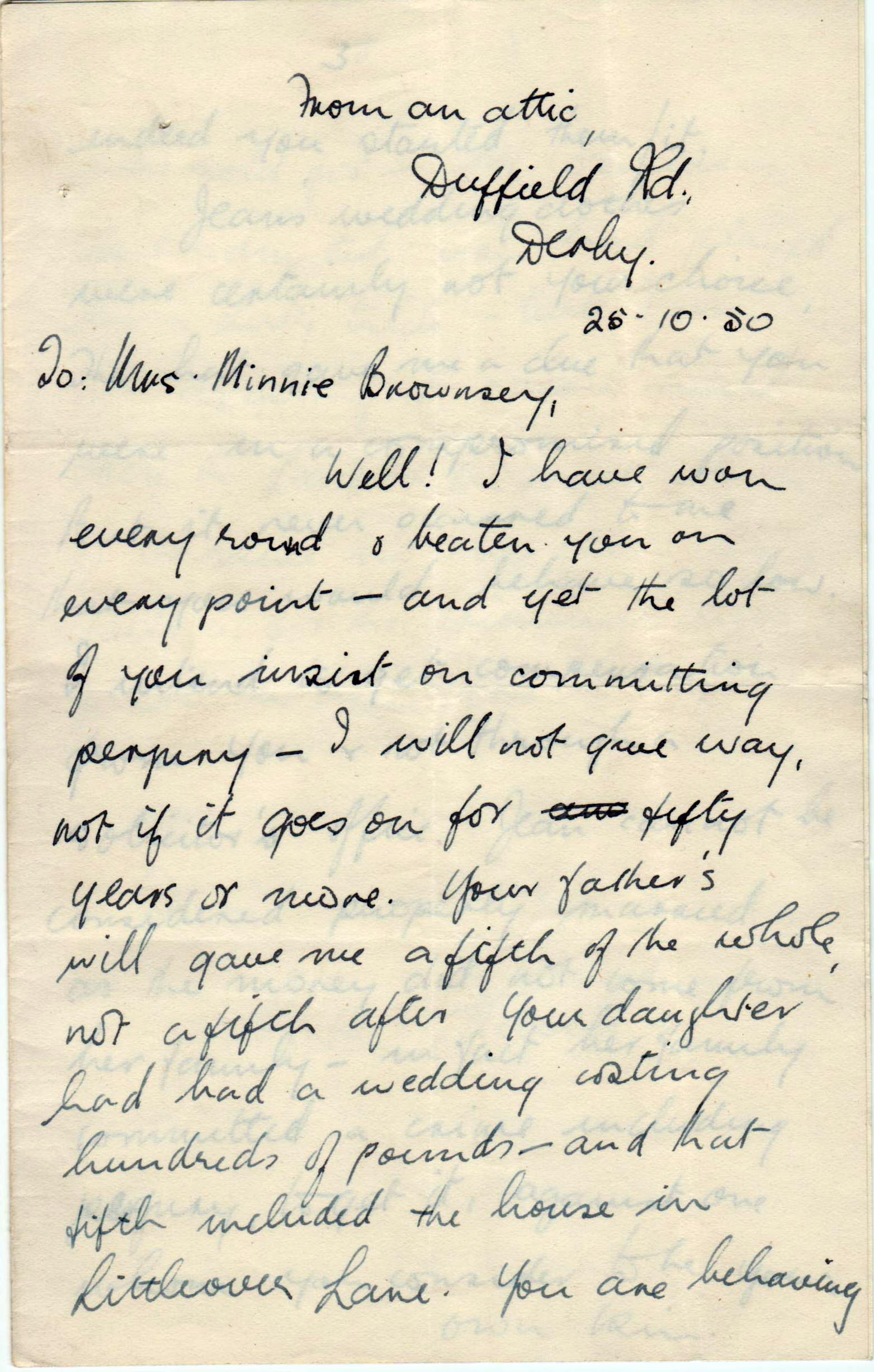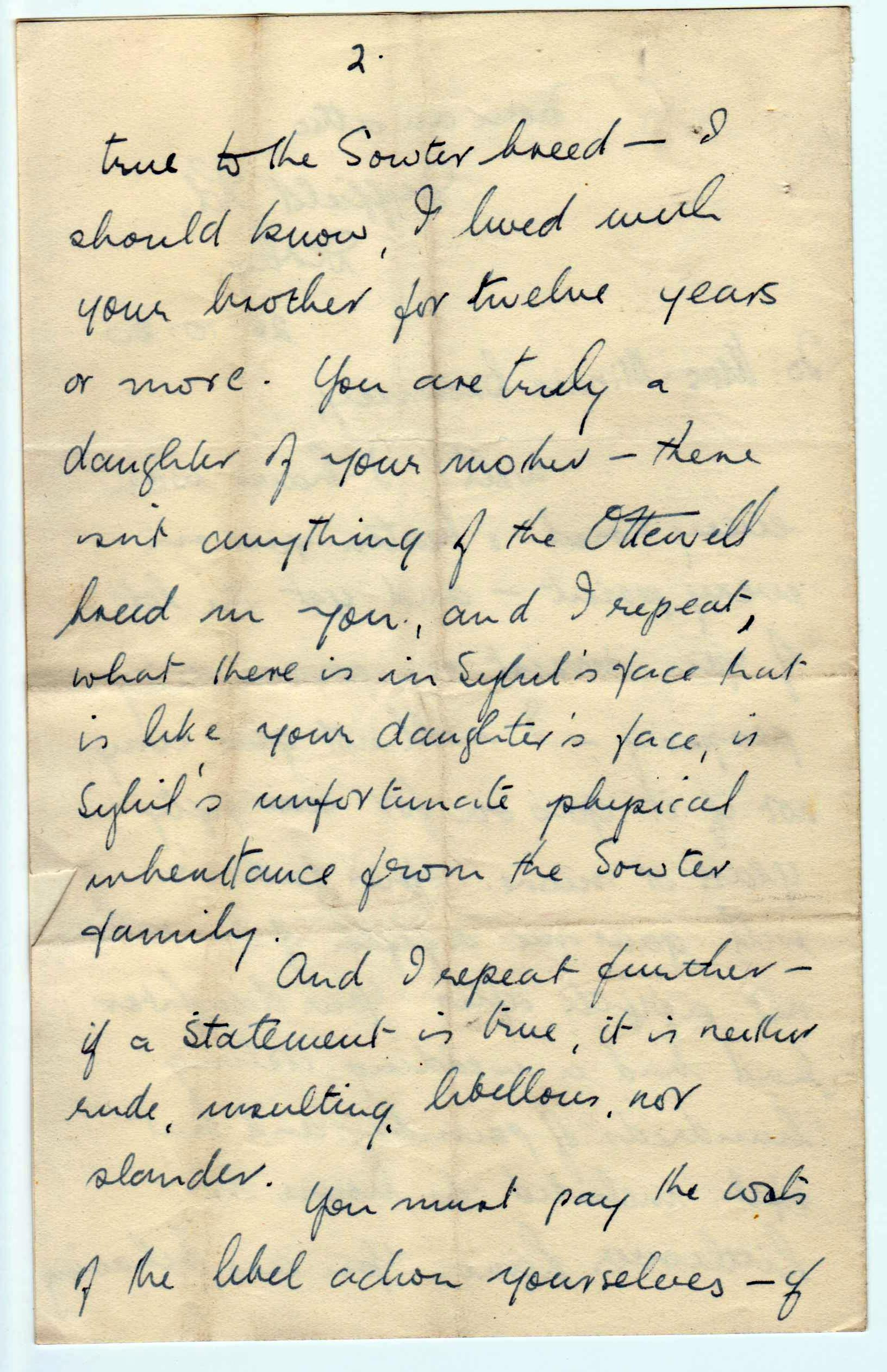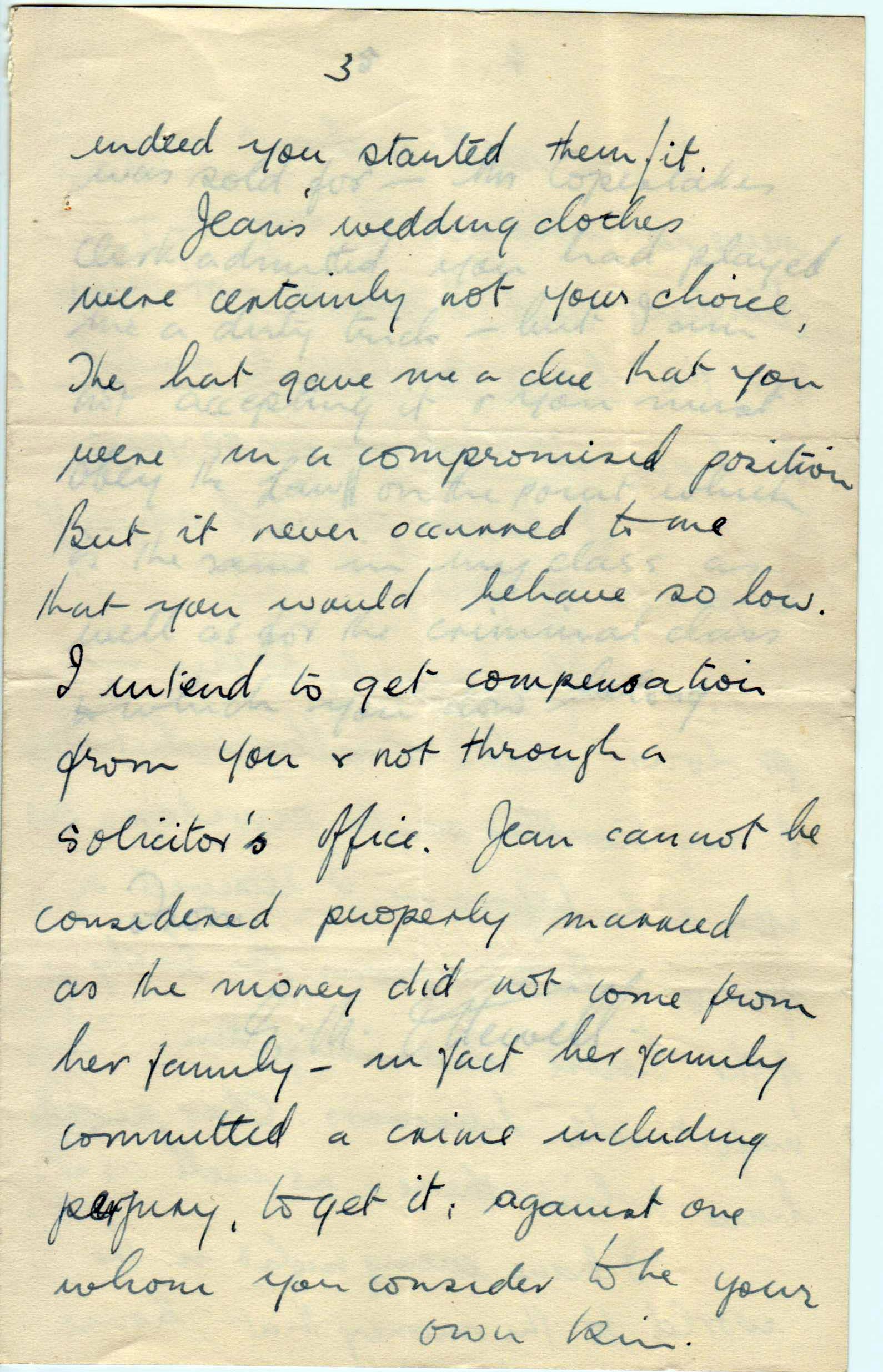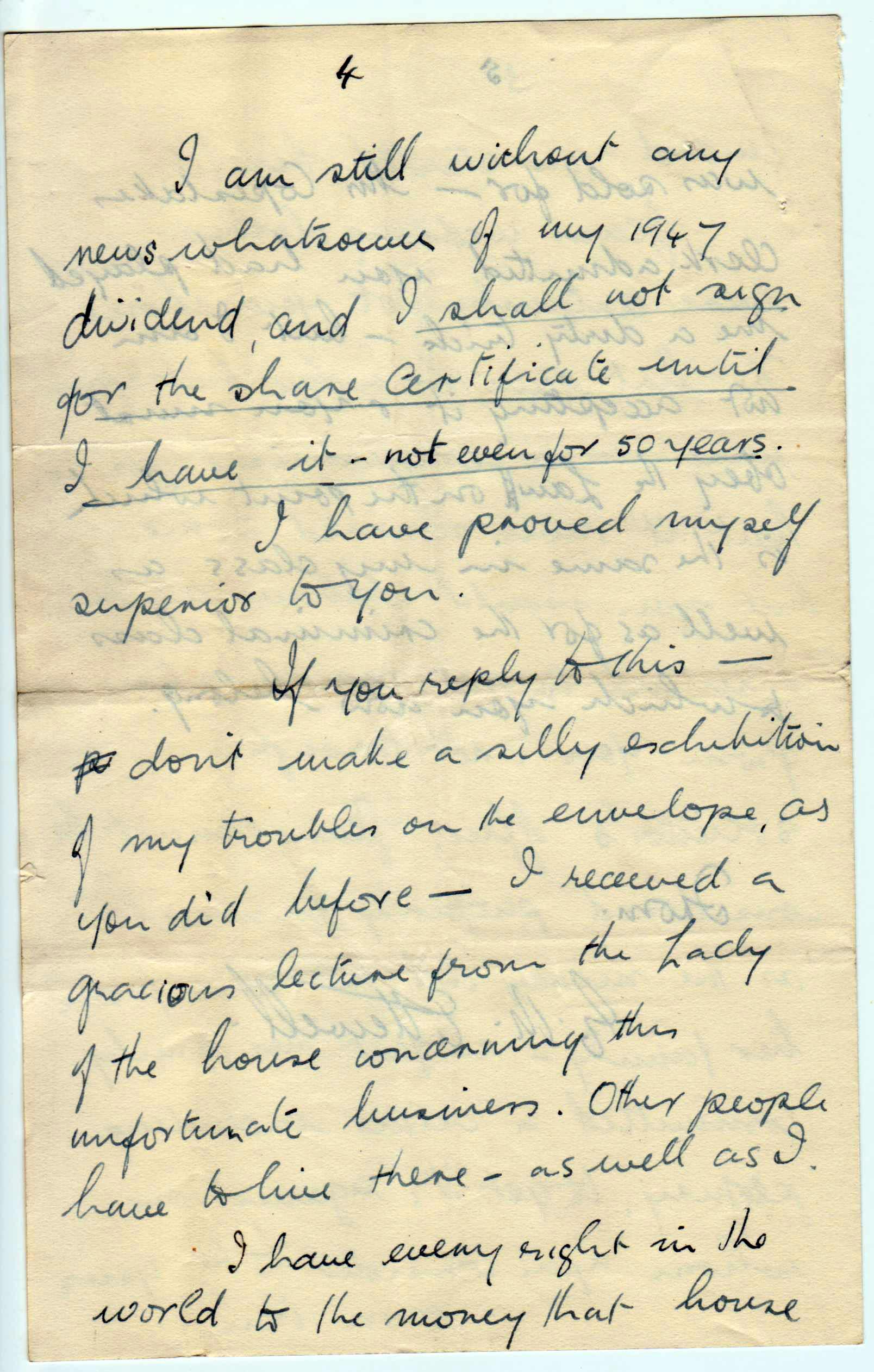The Ottewell–Brownsey Dispute of Postwar Derby
 This article examines the Ottewell Brownsey inheritance dispute in Derby following the 1947 death of Annie Louisa Ottewell. A deeply personal and legally fraught inheritance dispute unfolded within her extended family, exposing long-held resentments, questions of legitimacy, and accusations of perjury. Centred around a contested share of the estate—particularly a property in Littleover Lane, Derby—the dispute pitted members of the Brownsey family against a claimant who asserted her right to a fifth of the inheritance as stipulated in the will.
This article examines the Ottewell Brownsey inheritance dispute in Derby following the 1947 death of Annie Louisa Ottewell. A deeply personal and legally fraught inheritance dispute unfolded within her extended family, exposing long-held resentments, questions of legitimacy, and accusations of perjury. Centred around a contested share of the estate—particularly a property in Littleover Lane, Derby—the dispute pitted members of the Brownsey family against a claimant who asserted her right to a fifth of the inheritance as stipulated in the will.
The Ottewell Brownsey Inheritance Dispute – Full Breakdown
A scathing letter dated 26 October 1950 from an unnamed attic-bound relative to Mrs Minnie Brownsey reveals the emotional and accusatory tone of the conflict, touching not only on money and property but on identity, marriage, physical appearance, and familial loyalty. This correspondence offers a rare and raw glimpse into the social and legal tensions underpinning postwar British family inheritance cases.
Probate Entry
 OTTEWELL Annie Louisa of Abbe Ville, Sunny-hill, Stenson-road, Derby, widow, died 7 June 1947. Probate Nottingham 20 September to Jesse William Shaw, company secretary, and Marion Brownsey (wife of Lionel Raymond Brownsey).
OTTEWELL Annie Louisa of Abbe Ville, Sunny-hill, Stenson-road, Derby, widow, died 7 June 1947. Probate Nottingham 20 September to Jesse William Shaw, company secretary, and Marion Brownsey (wife of Lionel Raymond Brownsey).
Effects £4001 16s. 8d.
Letter Transcript (Images 2–5)
Page 1 (dated 26.10.50)
From an attic
Duffield Rd, Derby
26.10.50
To: Mrs. Minnie Brownsey,
Well! I have won every round & beaten you on every point – and yet the lot of you insist on committing perjury – I will not give way, not if it goes on for forty fifty years or more. Your father’s will gave me a fifth of the whole, not a fifth after your daughter had had a wedding costing hundreds of pounds – and that fifth included the house in Littleover Lane.
You are behaving
Page 2
 true to the Souter breed – I should know, I lived with your brother for twelve years or more.
true to the Souter breed – I should know, I lived with your brother for twelve years or more.
You are truly a daughter of your mother – there isn’t anything of the Ottewell breed in you; and I repeat, what there is in Sybil’s face that is like your daughter’s face, is Sybil’s unfortunate physical inheritance from the Souter family.
And I repeat further – if a statement is true, it is neither rude, insulting, libellous, nor slander.
You must pay the costs of the libel action yourselves – of
Page 3
indeed you started them; it.
Jean’s wedding clothes were certainly not your choice, the hat gave me a clue that you were in a compromised position.
But it never occurred to me that you would behave so low.
I intend to get compensation from you & not through a solicitor’s office.
 Jean cannot be considered properly married as the money did not come from her family – in fact her family committed a crime including perjury, to get it, against one whom you consider to be your own kin.
Jean cannot be considered properly married as the money did not come from her family – in fact her family committed a crime including perjury, to get it, against one whom you consider to be your own kin.
Page 4
I am still without any news whatsoever of my 1947 dividend, and I shall not sign for the share certificate until I have it – not even for 50 years.
I have proved myself superior to you.
If you reply to this –
don’t make a silly exhibition of my troubles on the envelope, as you did before – I received a gracious lecture from the Lady of the house concerning this unfortunate business.
Other people have to live there – as well as I.
I have every right in the world to the money that house
 Initial Analysis
Initial Analysis
-
The writer is asserting a legal and moral claim to a portion of Annie Louisa Ottewell’s estate, specifically referencing a fifth share including a house on Littleover Lane.
-
The dispute involves the Brownsey family, with accusations of perjury, libel, and financial manipulation around Jean’s wedding and inheritance.
-
There is a deep animosity between the writer and Mrs Minnie Brownsey, with repeated personal insults aimed at the Souter lineage and a contrast drawn between that and the Ottewell line.
-
The writer makes reference to Jean and Sybil – likely daughters or close relatives – and criticises their appearance, financial conduct, and social actions.
-
There’s also mention of a 1947 dividend and a share certificate, suggesting the writer may have expected income or ownership from estate-related stocks or holdings that had not been honoured.
Conclusion
The Ottewell Brownsey inheritance dispute was far more than a legal disagreement over a will—it laid bare the deep emotional rifts, class tensions, and unresolved loyalties within a mid-20th century Derby family. The bitter letter exchanged between relatives, the accusations of perjury and libel, and the long shadow cast by a contested property in Littleover Lane reflect how inheritance could fracture relationships for generations. Through probate records and surviving personal correspondence, we gain a rare and unfiltered glimpse into the private turmoil behind public legal proceedings. The Ottewell Brownsey inheritance dispute stands as a poignant case study in how legacy, entitlement, and identity can violently collide in the aftermath of death.
